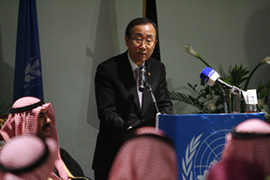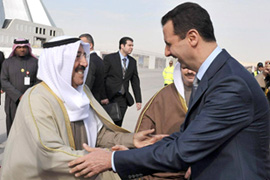Arab summit debates Gaza response
Saudi Arabia pledges $1bn to rebuild coastal territory, during meeting in Kuwait.

The meeting in Kuwait City came a day after Hamas, which has de facto control of Gaza, announced a week-long ceasefire.
Israel late on Saturday declared a unilateral ceasefire in the territory but warned that its forces would respond to any attacks from Palestinian fighters.
‘United effort’
|
“I call on the Arab summit to officially declare Israel as a terrorist state for the crime it did in Gaza” Bashar al-Assad, the Syrian president |
At least 17 Arab heads of state were attending the two-day talks, while senior representatives stood in for the other five member states of the Arab League.
Arab leaders have been divided on how to respond to Israel since it began its assault on the Palestinian territory on December 27, and have faced heavy criticism for their apparent inaction.
“In many ways, the Arab world was at a point of profound division until 48 hours ago – the sort of division that has not been seen since the early 1960s,” Abdallah Schleifer, professor emeritus of the American University in Cairo, told Al Jazeera.
“This summit is critical in that it is an attempt to come to some sort of consensus between two rival Arab camps that have emerged over the last year.”
Sheikh Sabah al-Ahmad Al-Sabah, the Kuwaiti emir, opened the meeting on Monday, saying that those attending the summit would aim to lay out “practical steps to stabilise the ceasefire”, as he opened the meeting.
Condemning the Israeli offensive as a “war crime and a crime against humanity”, he called for “those responsible to be held accountable”.
Mahmoud Abbas, the Palestinian president and head of Fatah, Hamas’ main rival, said that Palestinian political groups should work together to form a national unity government.
 |
| Rival Palestinian groups must work towards unity, Ban said [AFP] |
“What is required today … is to form a [Palestinian] national unity government which will then conduct presidential and legislative elections simultaneously,” Abbas said at the summit.
“What is needed and necessary now is that all Palestinians should meet to reach an agreement.”
His comments were echoed by Ban Ki-moon, secretary general of the United Nations, who was also attending the summit in Kuwait.
“The Palestinians themselves must face the challenge of reconciliation, and work to achieve a unified government under the leadership of President Abbas,” Ban said.
“I call on all Arab leaders to unite and support this endeavour. We cannot rebuild Gaza without Palestinian unity.”
Regional ‘rapprochement’
Also at the summit, the leaders of five Arab states held sideline talks aimed at repairing relations.
Syria and Qatar held Kuwaiti-mediated discussions with Saudi Arabia and Egypt in an attempt to heal a rift over the Israeli offensive on Gaza.
“The meeting was important, clear, and sincere to bring deep reconciliation among the attending leaders. I believe we left the meeting with a new page of relations that should benefit and strengthen the Arab position,” Hamad bin Jassim bin Jabr Al-Thani, Qatar’s prime minister and foreign minister, said after the meeting.
 |
| Al-Assad, right, said the Palestinian resistance against Israel should continue [AFP] |
While Qatar and Syria favour a firm stance on Israel, Egypt and Saudi Arabia has said that the conflict has its roots in the alleged interference of Iran.
“The meeting ended with a very positive note. Basically, the leaders were able to come together and reach a rapprochement in their views, in regard to Gaza,” Mohammed Vall, Al Jazeera’s correspondent in Kuwait City, said.
Bashar al-Assad, the Syrian president, had earlier come down hard against Israel at the summit.
“Arabs should declare an unequivocal support for the Palestinian resistance … I call on the Arab summit to officially declare Israel as a terrorist state for the crime it did in Gaza,” he said.
“Ceasefire does not mean the end of aggression as the invading forces are still in Gaza,” the Syrian leader said, urging “Arab solidarity… for our causes.”
Egypt and Jordan are the only Arab countries which have official ties with Israel.